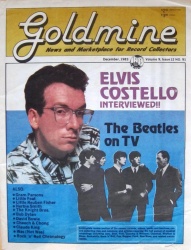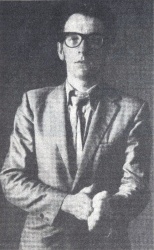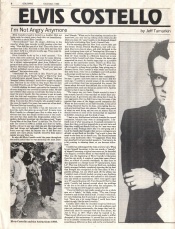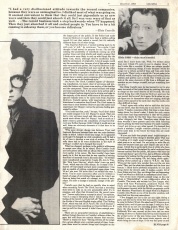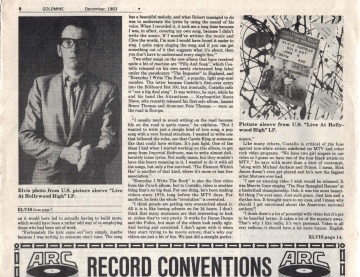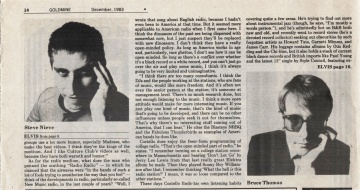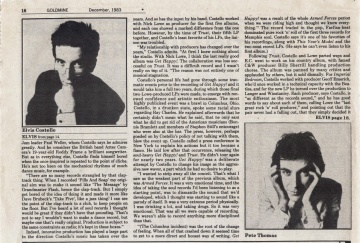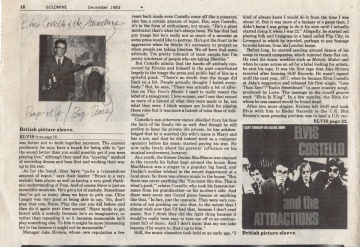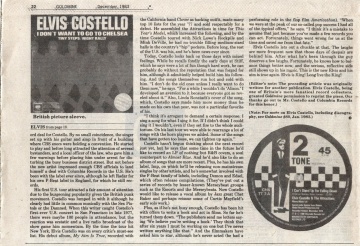Goldmine, December 1983: Difference between revisions
(formatting) |
(+text part 2) |
||
| Line 35: | Line 35: | ||
"''Imperial Bedroom'' made people give me a whole new set of labels," he flatly states. "The new George Gershwin and all that kind of stuff. I found it ridiculous. It's very flattering, but if you took it seriously you'd be a fool. There are a lot worse things 1 could have been called though, like the new Loverboy." | "''Imperial Bedroom'' made people give me a whole new set of labels," he flatly states. "The new George Gershwin and all that kind of stuff. I found it ridiculous. It's very flattering, but if you took it seriously you'd be a fool. There are a lot worse things 1 could have been called though, like the new Loverboy." | ||
Costello knew when he recorded ''Imperial Bedroom'' that he would alienate some of his rock audience and wipe out, perhaps permanently, the image that had followed him since he emerged with his first album, ''My Aim Is True'', in 1977. That's what he wanted to. "That record (''Bedroom'') was consciously made in willful disregard of the mainstream. It proved that you have to be in an already commanding commercial position to do something as different as that, and not be overlooked by | Costello knew when he recorded ''Imperial Bedroom'' that he would alienate some of his rock audience and wipe out, perhaps permanently, the image that had followed him since he emerged with his first album, ''My Aim Is True'', in 1977. That's what he wanted to. "That record (''Bedroom'') was consciously made in willful disregard of the mainstream. It proved that you have to be in an already commanding commercial position to do something as different as that, and not be overlooked by the larger part of the public. If the Police had made ''Imperial Bedroom'' it would have been a million-selling record. It's not that radical a record, but it's radically different than a lot of other things. | ||
"On ''Imperial Bedroom'', I wanted nothing more to do with rock 'n' roll," he continues. "As a style, I just thought it had served its purpose for me. I'm not dismissing the possibility of somebody coming up with another three cord trick wholly and totally original. But I think we're more likely to end up with things like the Stray Cats, which, although they're excellently done, lack the excitement of originality. A lot of people would say the same about me, because a lot of the earlier songs were very conscious quotes. On ''Imperial Bedroom'' I dispensed with it altogether and just used all the other forms. There is so much other music, although a lot of it is too unfamiliar to people to be effective. In some cases I think we were being too subtle on that record; you almost have to make a more conscious effort of parody if you want to use an old-fashioned style." | |||
On ''Punch The Clock'', Costello's eighth LP discounting compilation, he steers clear of extremes and presents the listener with a neat cross-section of the familiar and the unexpected. There are some brilliant new songs and some standard fare. A four-piece horn section and a pair of female backup singers lend a stirring soul edge to the majority of the record, while some of the more introspective ballads seem to be carry-overs from ''Imperial Bedroom''. Costello agrees, with reservations, with the interviewer's contention that ''Punch The Clock'' seems in some ways a cross between Bedroom and the earlier soul experiment ''Get Happy!'', minus the extreme feeling generated by either. | |||
"You could say that, yeah," he says, "but I don't think you could compare it to ''Get Happy!'' in mood. That one had a very extreme mood and this one doesn't; it's a much saner album that ''Get Happy!''. And as much as I didn't want to pursue the complexity of ''Imperial Bedroom'' any further because I didn't think it would serve as well, there are obviously elements of it that have to be continued on. | |||
"The most abrupt change was between Trust and ''Imperial Bedroom'' because there was two years between them in which I didn't record any songs. So it appeared as though I'd changed my style completely and I'd had a lot of time to develop a new style of writing. But naturally there had to be some similarities in the style of writing; I couldn't have changed that much." | |||
What has changed, perhaps, is the public's willingness to accept new ideas. As he stated, Elvis Costello could not have gotten away with an album like ''Imperial Bedroom'' earlier in his career. His fans wouldn't have been ready for it. But he says that he was capable of writing that kind of material even in his early days. "I'd written more complicated songs before I made ''My Aim Is True'', like 'New Lace Sleeves,' which didn't turn up until Trust, which was the fifth album. So it wasn't like I started off real simple and got more complicated. I was just as capable of writing complicated songs when I was 18 as I am now. It's more that I've refined the way I write. You're more conscious after you've written a bunch of songs of not writing them again. So I don't see there as being that much of a change, in terms of technique. It's more a change of attitude, change of the person." | |||
Costello says that he had no specific idea in mind when recording ''Punch The Clock'', but that a recording does seem to take on its own personality after it's in progress, and often that dictated how the record turns out. "I never really have a concept in mind," he explains, "but if a song is disrupting what I think is the general feeling of the record, it will get left off. There's a song on the B-side of the next English single called 'The Flirting Kind', which was left off of ''Punch The Clock'' because I felt it was more like something on ''Imperial Bedroom''. It was too soft for this record; it didn't have enough presence." | |||
There are no purposeful intentions of establishing a defined lyrical direction on Costello's albums either, he says, but still there are certain themes that reoccur. There's a reason for that: "Having written all the songs (for a given album) over a certain period of time, I suppose there must be certain things and thoughts on my mind. But I don't think like, 'Well, I've written about that, now I think I'll carry it over in chapter three.' I don't write like a novelist. If there are certain parallel things or continuing things, it's only because I wrote the songs over a certain period of time and I can only think of so much. There's only so much life. I'm not going to be willfully weird, looking for odd things and writing about witches and goblins and so forth. But I think you can look at the same elements of life from a different perspective as you change yourself, and get something new out of it." | |||
One thing Costello says he has learned is not to give away too much of his lyrical intent by printing the words to songs on the inner sleeves of his records. He only started doing that with ''Imperial Bedroom'' and now the new record, but he won't do it again. He'd rather let people figure out for themselves what he's singing, although many critics argued in the early days that his words were often difficult to hear. | |||
"I don't agree with critics who've said that the lyrics are too clever, that the word play is too clever," he comments. "I made a conscious effort this time to tone down being clever for clever's sake. I think the only reason critics have had that reservation is that we've printed the words clearly for the first time; they were printed rather obliquely last time. Therefore some things that they wouldn't have gotten until the 20th listening they're getting the first time because it's easily readable. I won't put lyrics on any other record. I've learned that that's a mistake. I might consider printing a book of lyrics some time in the future for those who are really interested. | |||
"It's not my fault that people aren't bright enough to have thought of these things in the first place. That way of looking at it might sound arrogant, but I can't help what goes on in my head. I'm not going to write like an idiot just because some guy can't respect the use of language. I think this is particularly true of critics who have become hardened and brutalized by awful work and have become cynical. But the public, the person who buys the record and doesn't get it for free, had a different attitude because he's looking for the good in something, not the negative. He's not saying 'Oh, he's being clever again.' ''Rolling Stone'' picked up a verse in 'T.K.O.', the lines ''"They put the numb into number they put the cut into cutie / They put the slum into slumber and the boot into beauty."'' I think that's perfectly acceptable; it's not just being clever for clever's sake. It makes a point. All of those things are true, they are things that are happening. I can't see what's so difficult to understand about that." | |||
"One of the most critically praised songs on the new album is "Shipbuilding", a rare collaborative effort by Costello. The music was written by Clive Langer, who, along with Alan Winstanley, produced ''Punch The Clock'', and was also recorded by Robert Wyatt, vocalist/drummer formerly with the British progressive outfit Soft Machine. Wyatt had a hit single with it in England. Costello cites Wyatt as one of his favorite vocalists, and described how the song came about. | |||
"Clive dragged me out to his car one night during a party and told me he wrote this tune and he wanted it to be sung by Robert Wyatt. He asked me if I'd have a go at writing lyrics, and he gave me the tape. I took it to Australia with me as sort of a traveling project. When I got there the idea became fully formed in my head. The Falklands War was current at the time and we were hearing all about it. Rather than having some reaction to the actual horror of the war, being away from home I tended to see some of the more ironic aspects, one of which being the loss of ships. If the war had gone on and | |||
{{cx}} | {{cx}} | ||
{{rttc}} | {{rttc}} | ||
{{Bibliography notes header}} | {{Bibliography notes header}} | ||
Revision as of 05:52, 4 September 2014
|
